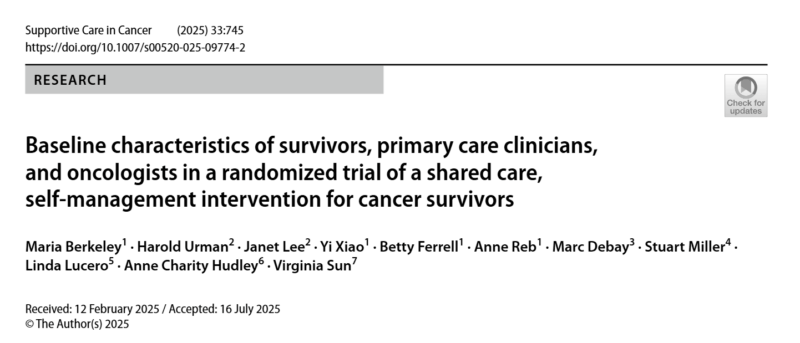Anne Charity Hudley, Bonnie Katz Tenenbaum Professor of Education at Stanford University and Associate Dean of Educational Affairs at Stanford University Graduate School of Education, shared a post on LinkedIn about a paper she co-authored with colleagues published in Supportive Care in Cancer:
“Our latest paper is open access and linked here.
Baseline characteristics of survivors, primary care clinicians, and oncologists in a randomized trial of a shared care, self-management intervention for cancer survivors
Maria Berkeley, Harold Urman, Janet Lee, Yi Xiao, Betty Ferrell, Anne Reb, Marc Debay, Stuart Miller, Linda Lucero, Anne Charity Hudley, and Virginia Sun.
Abstract
Purpose:
Lung and colorectal cancer (CRC) survivors experience late and long-term treatment effects and challenges with navigating care. Few evidence-based interventions exist to support survivors’ needs. This paper describes participant recruitment and pre-randomization baseline characteristics and outcomes from a survivorship self-management intervention trial in lung and CRC.
Methods:
Baseline outcome measures were collected from survivors, primary care providers (PCP), and oncologists. Enrolled participants were survivors of lung or CRC, were 4-6 months post-treatment completion, age 18 or older, and could read and understand English.
Survivor outcome measures included geriatric assessment, quality of life (QOL), communication, knowledge, and self-efficacy. PCP and oncologist outcome measures assessed perceived knowledge, communication, and care coordination regarding survivorship care.
Results:
The trial completed accrual over 4 years and enrolled 404 participants across 15 clinical practice sites in Southern California. At baseline, most survivors reported high (mean = 71.11/100) levels of physical functioning and social support but moderate (mean = 53.29/100) levels of social interactions.
QOL scores were low for emotional and functional well-being, with survivors of lung cancer reporting lower physical well-being (20.92/28) and total QOL (101.1/136). PCPs and oncologists reported minimal problems with exchanging information or transferring care in a timely manner. Survivors reported challenges with timely care, appointments, and support managing treatment effects.
Conclusions:
Baseline characteristics illustrate persistent challenges in survivor QOL and perceived quality of care coordination and communication among survivors, oncologists, and PCPs.
Implications for cancer survivors: Opportunities for improvements in cancer survivorship care delivery exist and will ultimately support survivors’ QOL and outcomes.”
Title: Baseline characteristics of survivors, primary care clinicians, and oncologists in a randomized trial of a shared care, self‑management intervention for cancer survivors
Authors: Maria Berkeley, Harold Urman, Janet Lee, Yi Xiao, Betty Ferrell, Anne Reb, Marc Debay, Stuart Miller, Linda Lucero, Anne Charity Hudley, Virginia Sun
You can read the Full Article on Supportive Care in Cancer.

You can find more posts about papers from Supportive Care in Cancer on OncoDaily.
